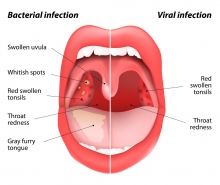Tonsil Problems

What are the tonsils and adenoids?

The tonsils are masses of lymphoid (immune system) tissue on either side of the throat. The adenoid is made of similar tissue and sits at the very back of the nose. The lymphoid tissues in these areas assist the developing immune system in the first 1-2 years of life. Viruses and bacteria that enter the body through the mouth or nose come into contact with the tonsils and adenoids and it is here that the body develops antibodies that make up the body’s immune response to these organisms. After this time, these organs are not essential for life or immunity and can be removed if they are causing problems.
What problems can occur with the tonsils?
There are many problems that occur with the tonsils. In children this is often related to infection ('tonsillitis'). Tonsillitis can come in many different forms and these are explained below. The tonsils can also become enlarged without being infected. This can obstruct the airway when you child is asleep and result in either snoring or sleep disordered breathing (the paediatric form of sleep apnoea). Read more about snoring and sleep disordered breathing here. There are a number of other rare tonsil problems and these often require specialist assessment to diagnose and treat appropriately.
Surgery for tonsil problems is one of the most common reasons for children to have an ENT operation.
What is Acute Tonsillitis?

The most common form and the one most people think of when they hear 'tonsillitis'. The symptoms of this are fever, sore throat, difficulty swallowing, enlarged lymph glands in the neck and bad breath. Usually you can see pus on the surface of the tonsils. Acute tonsillitis may be viral and will resolve on its own. The only treatment in these cases is pain relief. However it can be bacterial and in these cases you may require antibiotics to treat the infection.
What is Recurrent Tonsillitis?
When acute tonsillitis occurs multiple times in a year then it is classified as recurrent tonsillitis. Depending on the number of infections each year, removal of the tonsils may be the best treatment (see adenotonsillectomy).
What is Chronic Tonsillitis?
Sometimes the infection never goes away completely and you can have a persistent sore throat, bad breath and tender lymph nodes in the neck. This is also a reason to consider having the tonsils removed.
What is a Peritonsillar abscess ('Quinsy')?
Abscess formation around the tonsil sometimes complicates tonsillitis. This is a chance event but if someone suffers a quinsy on more than one occasion then tonsillectomy would be recommended to prevent further episodes.
Tell me about surgery for tonsil problems in children?
Click on the following links to understand more about tonsil and adenoid surgery in children